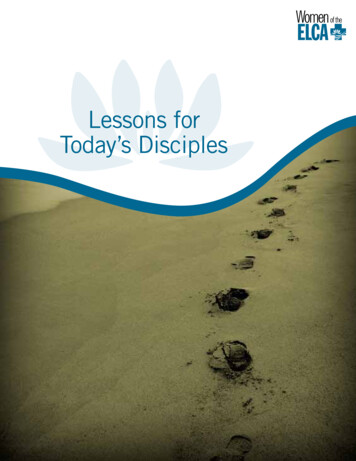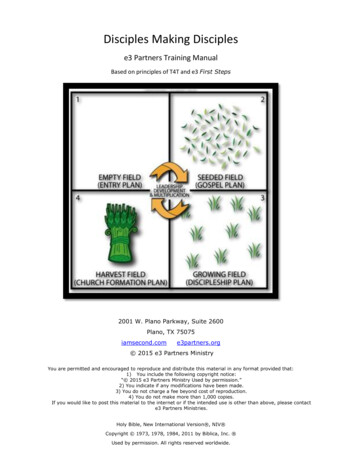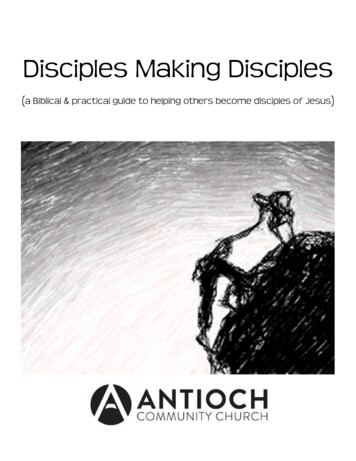
Transcription
Lessons forToday’s Disciples
Lessons forToday’s DisciplesContentsMarks of Discipleshippage 4What disciples practice and what it means for us.How to Use This Resourcepage 5A few suggestions for getting started.Lesson 1Praying the Lord’s Prayerpage 6Prayer is important in the life of a disciple. This lesson will highlightJesus’ example of prayer. Luke 11:1–13Lesson 2Studying God’s Wordpage 8Explore the understanding and application of God’s word in the life ofa disciple. This lesson will highlight the disciples’ common practicesin the early church. Acts 2:42–47Lesson 3Worshiping Godpage 10Discern the true meaning of praising God. This lesson will reflect onthe importance of worship. John 4:24Lesson 4Inviting Others to God’s Feastpage 12Understand the meaning of welcoming everyone to God’s feast. Thislesson will introduce Jesus’ model of invitation. Luke 14:7–23Lesson 5Encouraging One Anotherpage 14The work of encouraging one another happens in community. Thislesson will examine how to encourage one another in Christian love.1 Thessalonians 5:11–24continued on next page
Lessons forToday’s DisciplesContentsLesson 6Serving Our Neighborspage 16Following Jesus means serving others. This lesson will focus on servingothers as Jesus served. Matthew 20:20–28Lesson 7Giving Freelypage 18Giving begins with our hearts, and when we decide to give, thingshappen. This lesson will briefly address the joy of giving.2 Corinthians 9:1–15Counting the Costpage 20Jesus teaches about the cost of being a disciple. This reflection will helpyou discern areas of growth for you. Luke 14:25–35Study Notespage 22Additional scripture texts and suggestions for continuing on the journeyof discipleship.Copyright 2009 Women of the Evangelical Lutheran Church in America. All rights reserved. May bereproduced for use in Women of the ELCA congregational units and by synodical women’s organizations ofWomen of the ELCA provided each copy is reproducedin its entirety and carries this copyright notice. Pleasedirect all other requests for permission to reproduce towomen.elca@elca.orgLessons for Today’s Disciples was written by Valora KStarr. Theological Review by Reverend Ivis LaRiviereMestre.?wonkuoyDidWomen of the ELCA resources, such as this one, areavailable free to individuals, small groups, and congregations.Covering a variety of topics, we are bringing Lutheran perspectivesand new voices to issues that matter. By making a donation toWomen of the ELCA, you will help us continue and expand thisimportant educational ministry. Give online at womenoftheelca.orgor mail to Women of the ELCA, ELCA Gift Processing Center, P.O.Box 1809, Merrifield, VA 22116-8009.
Lessons for Today’s DisciplesA resource from Women of the ELCAMarks of DiscipleshipWhat is a disciple?For Scripture says:A disciple is a student who follows the teachings andpractices of a teacher. Consequently, we can say thatChristian discipleship is a lifelong journey of livingout and spreading the good news of Jesus Christ sothat others may believe. Jesus invited the disciples,and many others along the way, to embark on a faithjourney as they learned about his ministry. Eachdisciple responded with a resounding “Yes!”The Spirit of the Lord is on me,because he has anointed meto preach good news to the poor.He has sent me to proclaim freedom to theprisonersand recovery of sight for the blind,to release the oppressed,to proclaim the year of the Lord’s favor.(Luke 4:18–19)What are marks of discipleship?Contemporary disciples are marked by living out theseven faith practices within the context of the greatcommission. If we do not include these faith practicesin our daily discipleship, it may not be clear whosedisciples we are.There are no physical marks that identify a disciple,only practices that disciples engage in as they followJesus. Jesus the teacher invited the disciples to joinhim for the journey, and then he modeled for themseven practices that we can call the seven marks ofdiscipleship: praying, studying, worshiping, inviting,encouraging, serving, and giving.1 They are essential toeffectively accomplishing Jesus’ great commission intoday’s world.The seven lessons that follow here will help youdiscover or recover the importance of these practicesin the life of a disciple. Blessings, and enjoy thejourney!What does this mean for us?We too are invited to embark on this faith journey.Throughout the gospels, Jesus has left for us a trailof examples of how disciples are to carry out thegreat commission (Matthew 28:19–20) and the greatcommand (Acts 1:8).It is an intentional act to claim the life of a discipleand the seven marks of discipleship. And it is alife-long commitment, not a temporary assignment.Nor can it be accomplished alone: Jesus invited thedisciples to be part of his mission and ministry incommunity.1The seven marks of discipleship were developed by the author, Valora Starr, Women of the ELCA.4
Lessons for Today’s DisciplesA resource from Women of the ELCAHow to Use This ResourceThe resource can be used:This resource is designed to support you in yourcalling to be a disciple in order that you may: discover or recover the seven marks, or faithpractices, of discipleship; practice the seven marks of discipleship in yourdaily ministries; and empower other women to boldly live out theirfaith in Jesus Christ. The seven lessons are based on the seven marksof discipleship and include exercises for practicalapplication. Each lesson includes an overview ofeach of the marks and a biblical text that supports aformat of reading, reflecting, and responding to thecall of discipleship.Each lesson is designed to be: This resource can be used by anyone. Every womanshould begin this learning experience from wherevershe is on her journey.Some participants may be hearing about themarks of discipleship for the first time. Some participants may be familiar with a few orall of the marks but not actively practicing them. A balance needs to be maintained in whichwomen are engaged in a healthy dialogue aboutthese practices but also relating them to dailyministry.completed in one hour.interactive.Be creative when engaging these lessons. Rememberto pray before you begin and to close each sessionwith prayers of thanksgiving to God for providing newinsights and other blessings that were experienced inthe group. Read the assigned biblical text out loudbefore looking for the focus verses. Encourage womento be honest with their answers.In planning, the leader needs to rememberthe following: as a self-study or group study.to complement daily devotions.as a Bible study or in focus groups.as a weekend retreat.as a one-day retreat. Each lesson may beexplored with limited reflection and response.You might also consider using this resource as adevotional series to begin a circle meeting or unitmeeting.5
Lessons for Today’s DisciplesA resource from Women of the ELCALesson 1Praying the Lord’s PrayerLuke 11:1–13Praying is important in the life of a disciple. Thisof our relationships with God, others, and ourselves:God’s forgiveness enables us to release to God ourunresolved issues and hurts.lesson will briefly examine Jesus’ example of prayer.We are continually called to be in communionwith God through prayer. Prayer is both talkingand listening to God. Our relationships with Godand others grow deeper when we make theseconversations part of our daily devotion. As ourrelationship with God deepens, we also cometo know others in Christian love and grow in ourunderstanding of our faith.When we are persistent and bold in our prayers, theHoly Spirit helps us change our hearts and mindswhile gaining clarity about what we need. Persistenceshows the intensity of our need of God, who isalready at work in our lives.REFLECT on the different ways that God cares foryou as you praise God’s name.Jesus’ ministry was centered in a life of prayer. Heconstantly prayed to God (Luke 5:16; 16:12). Whenone of the disciples asked Jesus to teach them topray, he taught the disciples how to be in communionwith God.Make a list.READ Luke 11:1–13. Notice how Jesus arrangedthe prayer. First is an introduction that gives God allhonor and praise. This statement of praise sets thetone before we continue with our requests: Withoutpraising God first, our prayers can be a laundry listof needs and woes. Second, this prayer remindsus that God provides for all our needs. In our dailyconversations with God, we also witness God’sblessing in our lives. Third, the Lord’s Prayer teachesus about God’s forgiveness. This is the foundationNext, look at the story Jesus tells the disciples. Whatmeaning does this prayer have in your daily life?RESPOND to the following: Describe your prayer life.6
Lessons for Today’s DisciplesA resource from Women of the ELCAPersonal ReflectionThis reflection will help you assess your prayer practice. Be as honest and open as you can so that you get anaccurate picture of where you are and where you want to go with this practice.Assess the basics. Take a quick read of your prayer life.When am I praying?Where am I praying?What am I praying for?How am I praying?Plot the results.My prayer practice is low priorityhigh priorityPlan the work. Check all that are relevant.When it comes to prayer, I need to work on p praisep what to sayp forgivenessp balance: praying for self, othersp persistence in prayerp frequency of prayerp confidence in prayingp consistency of prayingp thanksgivingp listening to and for GodPractice prayer. Remember that prayer will guide you to be in communion with God and your neighbor.Read again Luke 11:1–13Remember that prayer is the key that unlocks the gift of faith in our lives. It requires two things: an attitudeof complete dependence on God’s mercy and the courage to ask God for what we need.Notes7
Lessons for Today’s DisciplesA resource from Women of the ELCALesson 2Studying God’s WordActs 2:42–47Studying God’s word is fundamental to the processdeeper relationships with God and with others asbrothers and sisters in God’s family.of discerning, understanding, articulating, andapplying the meaning of God’s word in the life of adisciple. This lesson will highlight common practicesthat were followed by disciples in the early church.REFLECT on verse 42: “They devoted themselvesto the apostles’ teaching ” Make a list of theopportunities available to you for studying God’s wordin community and fellowship.When Jesus was about twelve, he went to the Templeto study and listen to the elders. Studying God’sword in community is one mark of discipleship: Itis important to be with each other so that as westudy God’s word and pray, we grow in faith together.Community is the activator that encourages us, andothers, to grow. Jesus always taught in communitybecause that is where his ministry took place. Jesusfrequently spoke to his disciples in parables andexplained them in community so that they mightstruggle together to find a common understanding.We do not study for the sake of study. Take a lookat the sequence of the practices and results—study,fellowship, remembering Jesus (communion), servingthe community, caring for each other’s needs, andadding new believers.READ Acts 2:42–47. This was an exciting timefor the new church. Peter was preaching the goodnews, and thousands of new believers were cominginto the community. In studying God’s word, hearingthe apostles’ teachings, fostering fellowship, breakingbread together, gathering to pray, and sharingfinancial resources, the community came alive. Whenwe study together, we begin to see that the missionis larger than any one person could imagine oraccomplish. Fellowship, which comes from studyingin community, gives disciples opportunities to buildDo you recognize this pattern in your faithcommunity?RESPOND to the following: Describe your studypractice.8
Lessons for Today’s DisciplesA resource from Women of the ELCAPersonal ReflectionThis reflection will help you assess your practice of studying God’s word. Be as honest and open as you can sothat you get an accurate picture of where you are and where you want to go with this practice.Assess the basics. Take a quick read of your study practice.When do I study God’s word?Where do I study?What do I prefer to study?How do I understand my favorite story in the Bible?Plot the results.My study practice is low priorityhigh priorityPlan the work. Check all that are relevant.When it comes to studying the Bible, I need to work on p studying God’s wordp asking questionsp being open to learningp balance: personal and collective studyp listening to Godp frequency of studyingp finding joy in learningp consistency of studyingp disciplinep confidence in what I knowPractice learning about God’s word. It will inspire you to focus on the purpose of your study.Read again Acts 2:42–27Remember that studying God’s word is the key to growing in faith.Notes9
Lessons for Today’s DisciplesA resource from Women of the ELCALesson 3Worshiping GodJohn 4:19–26Worshiping God builds and strengthens a disciple’sREFLECT on how the Holy Spirit inspires you toconnection to and relationship with both God and thecommunity of faith. This lesson will reflect on theimportance of true worship.worship.Sometimes true worship is confused with the habitof “going to church.” There is also the popularbelief that an individual can worship sufficientlyalone. However, Jesus, the Son of God, madeworship central in his life and ministry (Luke 4:16).Jesus’ example makes any rationale or excuse fornot coming to worship meaningless or self-serving.Worshiping God in community was a regular practicein the lives of Jesus’ disciples.READ John 4:19–26. This story picks up in themiddle of Jesus’ conversation with the Samaritanwoman at the well. After a rousing round of riddlesabout water, the conversation shifts to an evendeeper subject—worship. The Samaritan womanbrings it up in an attempt to change the subject andmove the spotlight away from her, but Jesus tells herthat “the hour is coming” when worshiping God willnot be focused on a particular location but centeredin the way in which we worship God, in spirit andtruth. Worshiping God with a genuine and sincereheart is what is most important.Next, review verses 17–20. Think about the phrase“in spirit and truth.” What happens when yourdeepest hurts or needs connect with worship?Just like the Samaritan woman, you may have strongbeliefs about worship. What are some commonworship practices in your congregation that maycause tension or bring healing?RESPOND to the following: Describe your worshippractice.10
Lessons for Today’s DisciplesA resource from Women of the ELCAPersonal ReflectionThis reflection will help you assess your worship life. Be as honest and open as you can so that you get anaccurate picture of where you are and where you want to go with this practice.Assess the basics. Take a quick read of your worship practice.When do I worship?Where do I worship?What do I worship?How do I worship?Plot the results.My worship practice is low priorityhigh priorityPlan the work. Check all that are relevant.When it comes to worship, I need to work on p praising Godp being open to other worship stylesp my worship comfort zonep balance: personal and corporate worshipp listening for God in worshipp frequency of worshipp worshiping Godp consistency of worshipp discernmentp focusing on God when in worshipPractice worshiping God in spirit and truth. It will help you to discern the meaning of worship in yourdaily life.Read again John 4:19–26 and Hebrews 12:28bRemember that through worship we experience God’s love and grow in appreciating the amazing gifts thatGod has given to us.Notes11
Lessons for Today’s DisciplesA resource from Women of the ELCALesson 4Inviting Others to God’s FeastLuke 14:7–24Inviting others to God’s feast is essential toREFLECT on the custom of that day to issue twoaccomplishing the mission of a disciple. This lessonwill introduce Jesus’ model of invitation.invitations, the first to announce the party and thesecond to announce “Come, for everything is nowready.” Next, take a look at verses 15–20. How doyou handle rejections and regrets?For months, you have been planning an elegant galafit for royalty. Then the day of the party arrives, butno one shows up. You pace the floor and check yourwatch, but no one is coming.Jesus commands that we make more disciples.But unlike other teachers, Jesus simply invitedothers to follow him: No previous experience orother qualifications required or needed. Jesusdemonstrates that through a genuine invitation,the reign of God is open to everyone. Although thepractice of inviting others to God’s feast is often notincluded as a mark of discipleship, it is vital to themission of all disciples to make more disciples.READ Luke 14:7–24. All have been invited toGod’s feast. We must be ready to invite others andto accept and follow through on the invitations wereceive. Somewhere along our journey as disciples,we have forgotten the purpose for making such aradical invitation. Disciples are to be ready to bothreceive and offer an invitation. Because as we inviteothers, we meet Jesus, who leads us as disciples toget our work done!God is clearly the master in the banquet story. Heinvites the world to come to the banquet table, whereJesus is guest of honor. How are you at inviting the“least of these” to the table?RESPOND to the following: Describe how you areinviting.12
Lessons for Today’s DisciplesA resource from Women of the ELCAPersonal ReflectionThis reflection will help you assess your practice of inviting. Be as honest and open as you can so that you getan accurate picture of where you are and where you want to go with this practice.Assess the basics. Take a quick read of your practice of inviting.When do I invite others?What do I invite others to do?Whom do I invite?How do I invite others?Plot the results.My inviting practice is low priorityhigh priorityPlan the work. Check all that are relevant.When it comes to inviting, I need to work on p invitingp making disciplesp being open to invitationsp balance: implying and making explicit invitationsp understanding invitingp frequency in invitingp being confident in invitingp consistency in invitingp discernmentp focusing on God when invitingPractice by connecting the act of inviting to the act of inviting others to the banquet table. It will help youstay focused on the purpose of inviting.Read again Luke 14:7–24Remember that inviting others to meet Jesus is the way disciples get their work done!Notes13
Lessons for Today’s DisciplesA resource from Women of the ELCALesson 5Encouraging One Another1 Thessalonians 5:11–24Encouraging others is work disciples can onlyREFLECT on the ways we are called to encouragedo in community. This lesson will examine Jesus’example of encouragement as a natural part ofteamwork and motivation to get the job done.others. Make a list, and explain how you would carryout each one. Hint: There are eleven more directivesin verses 12–18.Encouragement from others at just the right momentspeaks volumes. It can mean the difference betweengiving up and knowing you’re okay. The receiver knowssomeone cares and feels that she matters. Just asJesus encouraged Peter to walk on water, we also arecalled to encourage others to stretch beyond whatthey think they can do. Encouragement in the faithcommunity is not just a pep talk: It is an affirmationand blessed assurance of what God can do in our lives.1.READ 1 Thessalonians 5:11–24. Jesus left a trailof “encouraging” accounts for the disciples and theearly church. This mark of encouraging is meant tobe practiced in community. The practice appearsto be about how we treat others, but it has less todo with others than it does with the change thatoccurs in ourselves. The act of encouraging anotherplaces the encourager in the other’s shoes. A deepsensitivity for the other’s situation and circumstanceis important, and you make a conscious decision tolet your actions be guided by the Holy Spirit. Yourwords of encouragement have a two-fold effect—theyare affirming for the other and faith-building for you.2.3.4.5.6.7.8.9.10.11.Build each other up—tell someone you appreciatethem and their gifts to the community.RESPOND to the following: Describe how you areencouraging others.14
Lessons for Today’s DisciplesA resource from Women of the ELCAPersonal ReflectionThis reflection will help you assess your practice of encouraging others. Be as honest and open as you can sothat you get an accurate picture of where you are and where you want to go with this practice.Assess the basics. Take a quick read of your practice of encouraging others.When do I encourage others?What prompts me to encourage others?Whom do I encourage?How do I encourage others?Plot the results.My practice of encouraging is low priorityhigh priorityPlan the work. Check all that are relevant.When it comes to encouraging, I need to work on p understanding the practicep developing relationshipsp receiving encouragementp appreciating the gifts of othersp knowing when to encouragep frequency of encouraging othersp confidence in encouragingp consistency in encouraging othersp discernmentp focusing on GodPractice examining the three commands (verses 16–18) to be joyful, pray, and give thanks. It will help youstay focused on the foundation for encouraging others.Read again 1 Thessalonians 5:11–24 and Romans 1:12Remember that when we encourage others, we are ourselves encouraged. Our faith grows and thecommunity benefits.Notes15
Lessons for Today’s DisciplesA resource from Women of the ELCALesson 6Serving Our NeighborsMatthew 20:20–28Serving is at the heart of Jesus’ ministry. A disciple’sgoal is to do as the teacher does. This lesson willfocus on serving as Jesus serves.What is the first thing that comes to mind when youhear “serve” and “to serve as Jesus served”? Makingthe connection between Jesus feeding five thousandand setting up food pantries and soup kitchensis easy. But Jesus calls us to be more than goodwaitstaff. There is nothing wrong with the ministryof feeding, but connecting serving with Jesus’conversation with the Samaritan woman, his takingtime for children, or his comforting of friends Marthaand Mary moves us beyond projects and charitableactivities to relationships.READ Matthew 20:20–28. Jesus and his discipleshad been in ministry together for a long time. Jesuswas a walking example of committing one’s life toserving God’s people—healing the sick, raising thedead, teaching, feeding, showing compassion andpraying for all he came in contact with. Even withall that, his disciples James and John and theirmother, Mrs. Zebedee, missed the point. It wasn’tabout positions of leadership, notoriety, and power;not a single one of these is more important thancaring for others. You are a disciple when you dowhat you never thought you would ever do. Jesuscalls us to think differently about how and why weserve others—not merely “doing for” or picking andchoosing who gets our attention and when. Serving asJesus serves brings us closer to Jesus, the one whodid not come to be served but to serve.REFLECT on positions of authority and power inyour congregation, women’s groups, and communityorganizations.Jesus had an odd way of describing leadership andauthority. Instead of the people serving the leader,the leader will serve them. What does it mean todayto be a servant leader? What does this kind of servinglook like today?RESPOND to the following: Describe your practice ofserving.16
Lessons for Today’s DisciplesA resource from Women of the ELCAPersonal ReflectionThis reflection will help you assess your practice of serving others. Be as honest and open as you can so thatyou get an accurate picture of where you are and where you want to go with this practice.Assess the basics. Take a quick read of your practice of serving.When do I serve others?What leads me to serve others?Whom do I serve?How do I serve others?Plot the results.My practice of serving is low priorityhigh priorityPlan the work. Check all that are relevant.When it comes to serving, I need to work on p getting out of my comfort zonep servingp being open to opportunitiesp seeking opportunities to servep learning new ways to servep frequency of servicep confidence in servingp consistency in servingp service that is focused on Godp discerning my service nichePractice exploring your motives for serving and learning to serve as Jesus served. It will help you stayfocused on the purpose of serving.Read again Matthew 20:20–28Remember that serving not only puts our love into action but also inspires and motivates other disciples to dothe same.Notes17
Lessons for Today’s DisciplesA resource from Women of the ELCALesson 7Giving Freely2 Corinthians 9:1–15Giving is a heart exercise, and one of God’sunexplainable mysteries. This lesson will reveal thatwhen we decide to give, things happen.had made judgments about this “poor” church andtheir ability and desire to give. He soon learned animportant lesson: We all have something to give.Giving does not start with our pocketbooks. Rather,it begins with our hearts. We must know (notintellectually but in our hearts) that everythingbelongs to God. Giving is merely the mechanismfor distributing the resources needed (time, gifts,dollars, actions) to care for God’s creation. Giving isoften confused with “giving up” or losing something,or creating scarcity and deficiency. This mark ofdiscipleship is the toughest to grasp because of ourculture’s practices around giving and receiving andthe power of resources. However, the mystery is thatwhen we give generously and freely, we find that themore we give, the more there is to give. This practiceis too complex for our heads but not for our hearts.Our attitudes about giving and its importance toGod’s plan are more important than the amounts wegive. (Luke 21:1–2)REFLECT on these familiar words: “Merciful Father,READ 2 Corinthians 9:1–15. Paul was on his thirdmission trip to raise money for the impoverishedchurches in Jerusalem. While in Macedonia, hewitnessed an overwhelming act of sacrificial giving—the churches in Macedonia were poor themselvesbut collected an offering and presented it to Paul.They wanted to help. Their giving was genuine andfrom the heart. Paul had not been expecting it—hewe offer with joy and thanksgiving what you have firstgiven us—ourselves, our time, and our possessions,signs of your gracious love. Receive them for the sakeof him who offered himself for us, Jesus Christ ourLord” (from the liturgy). Concentrate on the boldedwords.Do you generally think of what you might give as whatGod has first given you—yourself, your time, and yourpossessions? Look again at verses 6–15. What arethe benefits of generously giving to God’s work?RESPOND to the following: Describe your practice ofgiving.18
Lessons for Today’s DisciplesA resource from Women of the ELCAPersonal ReflectionThis reflection will help you assess your practice of giving. Be as honest and open as you can so that you getan accurate picture of where you are and where you want to go with this practice.Assess the basics. Take a quick read of your practice of giving.When do I give?What do I give to?Why do I give what I do?How do I decide to give?Plot the results.My practice of giving is low priorityhigh priorityPlan the work. Check all that are relevant.When it comes to giving, I need to work on p giving freelyp tithing and/or first fruits givingp taking opportunities to givep being a cheerful and sacrificial giverp listeningp frequency of givingp confidence in givingp consistency in givingp discerning my givingp complete giving: time, money, giftsPractice separating the mark of giving and what our culture says about giving. It will help you stay focusedon the purpose of giving and your part in God’s mission.Read again 2 Corinthians 9:1–15Remember that everything belongs to God. Giving helps us participate in God’s mission as full partnersmaking things happen!Notes19
Lessons for Today’s DisciplesA resource from Women of the ELCACounting the CostLuke 14:25–35Jesus teaches about the cost of being a disciple.This section will help you discern where you needstrengthening and growth.REFLECT on what it means to “give up everything.”We have often heard, “anything worth having willcost you.” That’s all the motivation many peopleneed, but following Jesus is not the same as decidingto buy that dream car or book a family cruise. Yes,discipleship will cost you, and it is a decision thatmust be weighed carefully.And Jesus stops yet again to teach.READ Luke 14:25–35. Jesus was growing inpopularity. He and his disciples had been on awhirlwind journey of teaching and healing, and thecrowd now was bigger than ever after the healingof the “bent over” woman. Everyone was caught upin being with Jesus, and now in the presence of hishost, a prominent Pharisee, Jesus heals another.Everyone was ready to throw caution to the wind andsign on to being a disciple. In the midst of this, Jesusinterrupted himself and told them: “Anyone whodoes not carry his cross and follow me cannot be mydisciple.” Jesus wanted the crowd to think throughtheir excitement about him and to acknowledge whatit would mean to really follow him.Take a look at verses 28–30. Then describe the costof discipleship today.RESPOND by making a list of the attributes andcommon uses of salt after rereading verses 34–35.Describe what salt and a disciple have in common.How salty are you?REMEMBER that discipleship is total submissionand commitment to the teacher.20
Lessons for Today’s DisciplesA resource from Women of the ELCASettling upAfter figuring the cost, settling up gives you a complete picture of where you’re going and what you need forthe journey.Discipleship is a way of life, and over time, these seven marks become natural parts of how you live your life.Remember, thi
The seven lessons are based on the seven marks of discipleship and include exercises for practical application. Each lesson includes an overview of each of the marks and a biblical text that supports a format of reading, reflecting, and responding to the call of discipleship











